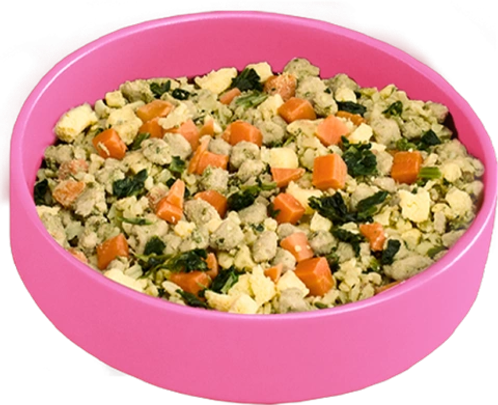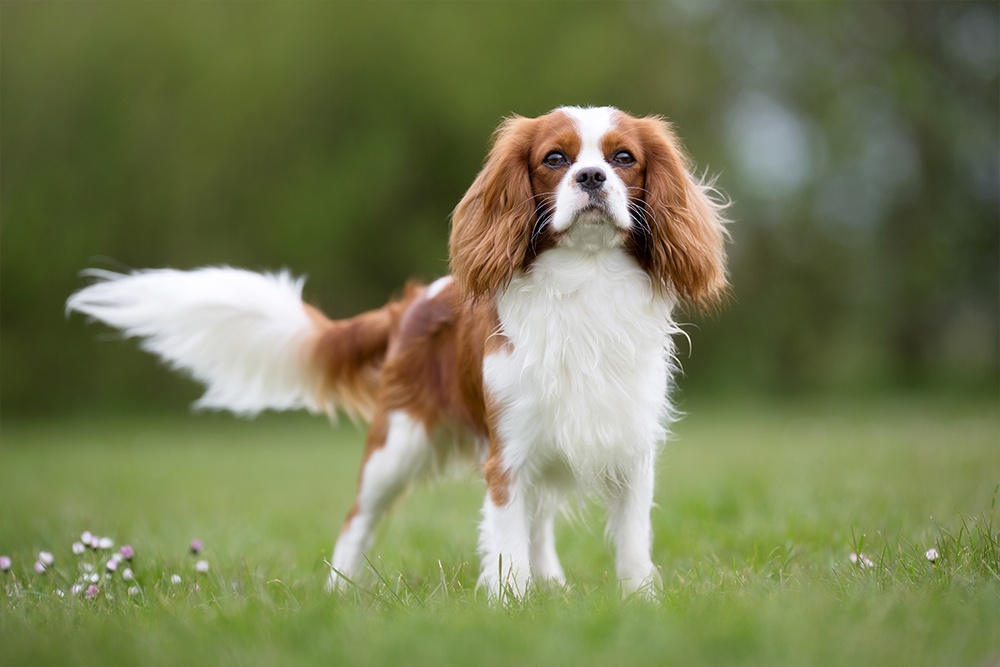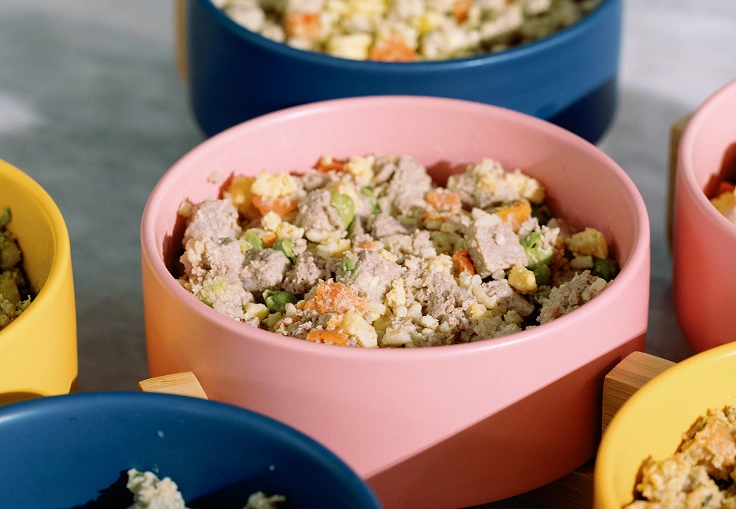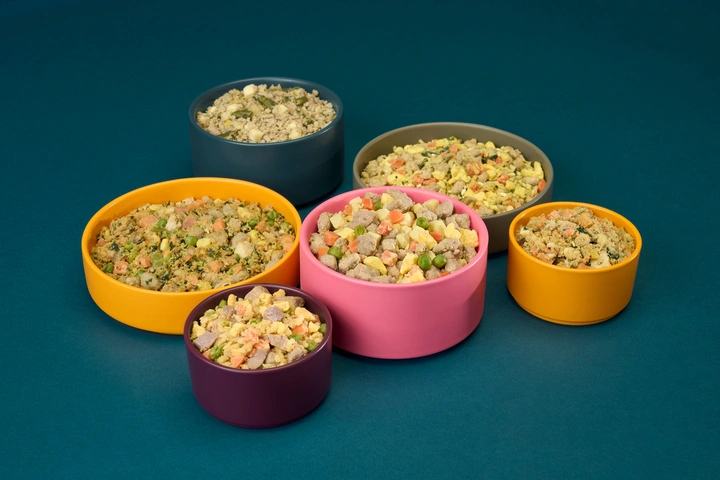The Cavalier King Charles Spaniel combines the best of both worlds: a companionable lap dog who enjoys belly rubs and an athletic, energetic dog who can rival true sporting breeds with her tenacity and agility. Beautiful and small, this breed is a champion both in sporting events and in the tail-wagging department. Unfortunately, this peppy spaniel breed’s flair and charisma can quickly be dulled by skin allergies that may severely affect her quality of life.
Type of Coat
The Cavalier’s coat is medium length and silky soft to the touch. By adulthood, most Cavaliers will have feathering on their legs, feet, chest, ears, and tail. The Cavalier coat is easy to care for and generally needs a quick brush or comb through a few times a week depending on the dog’s active and athletic aptitude and opportunity. This breed is an average shedder but does not require specialized care such as clipping or trimming, though some Cavalier owners trim the fur and feathering that can grow between the pads on the feet.
Susceptibility to Skin Allergies
Unfortunately, the Cavalier’s sleek coat and healthy skin can be susceptible to allergic reactions. Without treatment, skin allergies can make like uncomfortable for your Cavalier and impact her quality of life. Frequent and excessive itching causes damage to the skin due to hot spots and constant scratching, biting, and rubbing. Yeast and bacterial infections may develop if skin allergies are not handled quickly and appropriately.
Allergy Locations on the Cavalier King Charles Spaniel
Cavaliers typically develop allergies in specific areas, particularly the face, paws, legs, sides, and hind end; additional areas of particular trouble include the belly and the folds of the skin. A dog continually and repeatedly chewing or biting around these locations is likely suffering from allergies. Other signs of skin allergies in Cavaliers include flaky skin and dandruff, as well as patches of dry and scaly skin in the above-mentioned body areas. Also, the Cavalier’s ears are allergy-prone spots that, if untreated, can become infected and painful, leading to suffering, or worse, eardrum damage and deafness.
The Connection Between Skin and Food Allergies
Environmental and genetic factors can cause skin allergies in some Cavaliers. Fleas, dust mites, mold, pollen, and household chemicals are all prime allergen suspects that can cause atopy, resulting in rashes, sores, and fur loss. Cavaliers are genetically predisposed to developing ichthyosis, a severe skin condition that results in large, scaly, dry flakes of skin; often this skin condition occurs early in the dog’s life, and while there is no cure, specially mediated shampoos and essential oils, such as fish oils, can provide the Cavalier with some relief from these symptoms.
A primary cause of skin allergies in Cavaliers are internal food intolerances or allergies especially to animal proteins such as chicken and beef. Cavaliers are prone to food allergies, specifically additives, fillers, and chemical preservatives that can trigger allergic reactions.
Treatment Options
For environmental and genetic skin allergies, relief can be found in a variety of treatments. Organic, hypoallergenic, sulfate-free shampoos with anti-inflammatories such as aloe vera and hydrocortisone can help soothe and calm the Cavalier’s inflamed skin. Antihistamines, corticosteroids, topical creams, and organic hot spot sprays are also methods by which to manage skin allergies.
Skin allergies that are the result of food allergies are trickier to diagnose and manage. The first step is to consult with a veterinarian to determine if food is the basis of your Cavalier’s allergies. The veterinarian and a board-certified veterinary nutritionist can create the right diet for your Cavalier spaniel through a process of tests and elimination diets. Limited-ingredient and fresh dog food diets are often the best means by which to diagnose food allergies. Consult with your veterinarian about the following steps for conducting an elimination diet or food trial:
- Feed your Cavalier new, pure food for a minimum of eight weeks. Be sure to feed a limited or single-ingredient diet during this period to provide the most accurate results.
- The food should have single sources of animal protein, carbohydrate calories, and vegetable protein; the diet can be commercially produced or cooked. Proteins such as rabbit and peas or fish and potato are ideal choices for a Cavalier with a potential food allergy. Steer clear of foods that include unidentified proteins and other natural flavors.
- Avoid feeding your Cavalier spaniel supplements, table food, treats, or flavored medications as those items can alter the results of the food trial.
- After at least eight weeks, slowly reintroduce your Cavalier’s regular food and observe whether the allergies return.
You can also add probiotics to your Cavalier’s food which can strengthen her digestive system as well as reduce inflammation and bolster your dog’s immune system. Dog probiotic supplements are affordable and offer an alternate method to reduce allergy reactions or eliminate the allergy altogether. Recent research has discovered that probiotics help decrease the level of inflammatory reactions to allergens by supporting a stronger canine immune system.
Keys to Fighting Food-Based Allergies
One of the best ways to tackle skin allergies that are food-based is a fresh food diet. Commercial dry and wet foods often fail to provide the necessary nutrition and quality that your Cavalier needs to live a healthy, allergy-free life. Fresh food has healthy fats and fatty acids such as Omega-6 and Omega-3 which can be found in a variety of sources such as fish oil and sunflower oil. A fresh food diet will also have zinc, B-vitamin complexes, and essential amino acids, all of which may calm inflammatory responses to allergens.
The following chart offers some potential solutions to the variety of food allergies that Cavalier spaniels may develop:
| Condition | Dietary Needs and Adjustments |
|---|---|
| Coat Color Changes | Increase amino acids which can be found in protein (>75 grams per 1000 calories); use our calculator to convert a label percentage to the caloric basis (grams per 1000 calories) |
| Concurrent GI Signs | Avoid foods with tryptamine and histamine such as dairy or fermented vegetables and meats (yes, this includes bacon); try a simple ingredient food trial |
| Chronic Itching and Dermatitis | Fortify the diet with Vitamin E, B Vitamins, Zinc, omega-6 and the omega-3 fatty acids found in fish oil; add a probiotic; try a simple ingredient food trial |
| Dull Coat and Scaling | Adjust EPA and DHA levels in the diet (added fish oil being the most common way); try a food that has added zinc |
| Dandruff and Crustiness | Add Zinc and Vitamin A levels |
How Fresh Food Can Help
A fresh food diet that has real, visible ingredients, well-preserved fats, and the right amount of antioxidants can reduce or even eliminate your Cavalier’s skin allergies. Commercial dry kibble is typically cheaper and lasts longer than fresh diets; however, commercial foods fall far short of including the nutrients and antioxidants that your dog requires to be happy and healthy. The heating process by which kibble is created and the lack of regulation in the industry means that you may pay less for the food, but your dog pays up front for the lack of nutrition; indeed, you may end up paying more in the long run in veterinary bills. On the other hand, fresh food diets do not have the fillers and artificial ingredients found in some commercial kibble; therefore, your Cavalier is less likely to develop food allergies when she eats a fresh food diet.
Proper fresh food diets will have minerals and fatty acids that work together to keep your Cavalier’s skin and coat healthy, strengthen the immune system, and fight inflammation that is often the first sign of an allergic reaction. Custom fresh food recipes are another option that helps limit your dog’s exposure to food allergens.
About Nom Nom
Many Cavalier King Charles spaniels require specialized, fresh food diets to manage or prevent skin allergies related to food intolerances. Nom Nom offers fresh dog food diets which are custom made and delivered straight to your home. These perfectly portioned fresh food batches will satisfy your Cavalier’s hunger while also providing her with the nutrients she needs to stay allergy-free.
Each batch of our fresh food includes the Nutrient Mix that provides a powerful combination of essential minerals and vitamins that every dog needs for a healthy diet and management of allergic reactions. Our Nutrient Mix includes Vitamins E and A for coat and skin health. Magnesium, zinc, and selenium are also part of the Nutrient Mix and provide extra immune system support. Our fresh food diets allow your Cavalier spaniel to eat well and enjoy a high quality of life.
References
1. Summers, F., O’Neill, D., Church, D., Thomson, P., McGreevy, P., Brodbelt, D. Prevalence of disorders recorded in Cavalier King Charles Spaniels attending primary-care veterinary practices in England. Canine Genetics and Epidemiology, 2 (4), (2015).
2. Kang, M., Kim, H., Jang, H., Park, H. Sensitization rates of causative allergens for dogs with atopic dermatitis: detection of canine allergen-specific IgE. J Vet Sci, 15 (4), 545 - 550 (2014).



